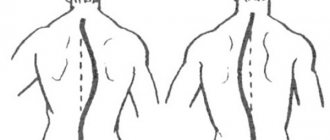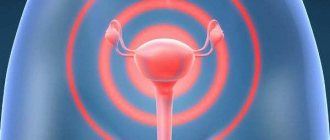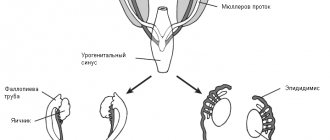How do birth control pills affect the body?
Birth control pills contain ethinyl estradiol and a progestin component. They begin to be taken from the first day of the menstrual cycle and set the rhythm for the entire month. A stable minimum concentration of estrogen is maintained in the blood. The pituitary gland receives a signal that there are enough hormones, so FSH synthesis is blocked. Progestins inhibit the release of luteinizing hormone, so the follicle does not ovulate and it is impossible to become pregnant.
But menstruation comes after the end of the drug package during a seven-day break . They differ in nature, duration and intensity from regular periods. With the use of contraceptives, less blood is lost and the pain that many women experience in the first days disappears. In addition to inhibiting ovulation, contraceptives have the following effects:
- thickening of cervical mucus;
- change in the functional layer of the endometrium;
- reduction of PMS symptoms;
- antiandrogenic effect of some COCs.
Normally, when using contraceptives, there should be no delay in menstruation. If this symptom is observed, you need to change the drug or completely stop using it.
The additional effects of birth control pills are used for medicinal purposes. They are prescribed for severe premenstrual syndrome, in the initial stages of endometriosis, and for mastopathy.
Side effects
Midiana's instructions describe cases when the medicine provokes negative reactions from organs and systems.
The most common side effects will be:
- pain and engorgement of the mammary glands;
- headache, even migraine, dizziness;
- emotional instability, nervous disorders;
- weakening or increasing libido;
- hormonal imbalance;
- bleeding in the middle of the menstrual cycle;
- loss of appetite;
- increase in body weight due to fluid retention in the body, development of edema;
- nausea, sometimes vomiting, diarrhea or persistent constipation;
- abdominal pain after eating;
- vaginal candidiasis;
- increased risk of blood clots.
Sometimes patients note a decrease in body weight, hearing loss, intolerance to contact lenses, and the appearance of a skin rash.
The effect of birth control pills on the monthly cycle
A properly selected contraceptive in healthy women does not cause menstrual irregularities. The risk of failure increases when using older generation drugs:
- Rigevidon;
- Microziston;
- Triquilar.
They contain ethinyl estradiol and levonorgestrel in high doses. Sometimes a similar effect is observed when using other hormonal drugs: Depo-Provera, Norkolut, Danazol, Zoladex.
The following drugs have less effect on the monthly cycle:
- Silhouette;
- Regulon;
- Novinet;
- Belara;
- Midiana.
Yarina, Janine and Jess have an antiandrogenic effect. Zoely belongs to a new type of monophasic drugs, which contain natural estrogen. It has less impact on the cycle. For premenopausal women, as well as those who do not have periods after taking contraceptives, it is recommended to switch to the three-phase contraceptive Qlaira.
During your appointment
After stopping taking birth control pills, the arrival time of menstruation is relatively stable, bleeding begins 2-3 days after the last dose . During the adaptation period, which lasts up to 3 months, disruptions in the monthly cycle and scanty brown discharge between menstrual bleeding are possible.
Later, your periods should return to normal. If this does not happen, you need to consult a doctor. First, the gynecologist recommends excluding pregnancy. The next stage is replacing the drug. The doctor will select a COC with a minimum dose of progestogen, for example:
- Rigevidon;
- Miniziston;
- Microgynon;
- Tri-regol.
If the cycle does not level out within three months, you should stop taking hormonal birth control pills.
Women who do not follow the instructions for the drug and do not take a break for 7 days after the last pill can cause a delay in menstruation and amenorrhea. It must be remembered that this scheme is used only in preparations that contain 21 active tablets and 7 pacifiers.
The continuous regimen is used as a therapeutic regimen in premenopausal women. They are recommended to take contraceptives for 3 months in a row and only after that take a break for 7 days.
After cancellation
After completing a course of taking COCs, it takes several months to restore the cycle; rarely, the suppression of the pituitary gland occurs so severely that regular periods begin to appear only after a year. In most cases, the cycle recovers on its own, but sometimes hormonal treatment is required. The doctor prescribes it after ruling out possible pregnancy. Drugs used:
- dydrogesterone;
- micronized progesterone;
- clomiphene citrate;
- dopamine antagonists.
A delay in menstruation after stopping birth control pills is observed in only 0.7% of women, and studies cannot yet prove a direct connection of this condition with the use of COCs.
Interaction between the drug Median and alcohol
If you have not taken birth control pills before, you should take your first pill on the first day of your period. In this situation, you do not need to use condoms from the start of taking the drug.
You can also start taking Median during the period from the 2nd to the 5th day of your period, but in this case it is important to use condoms for another seven days after starting to take the drug.
It is recommended to take the tablets at the same time every day, regardless of meals. However, small deviations from time are not dangerous. If the delay in taking the next tablet is no more than 12 hours, the effect of the drug is not reduced.
It is recommended to take the tablets in the order indicated on the blister, but this rule is not strict. In all Median tablets, the dose of hormones is the same, so the order of administration is not important. It is important to take one tablet per day.
When all the tablets in the blister are finished, you need to take a 7-day break, during which you do not need to take tablets. During these days, withdrawal bleeding may begin, which is similar to your period.
The next package should be taken on the 8th day after a 7-day break. In this case, it does not matter at all whether your period has already started or ended by the time you start taking the next package.
While taking certain medications, the contraceptive effect of Mediana may decrease, which can lead to unwanted pregnancy. These drugs include antibiotics (Rifampicin, tetracyclines, penicillins), sleeping pills (Phenobarbital), drugs for epilepsy (Carbamazepine, Phenytoin), drugs used to treat fungal infections (Griseofulvin), and drugs that contain St. John's wort (Novo-Passit). and others.
A decrease in the effectiveness of Median while taking these drugs may cause breakthrough bleeding or spotting. This is not dangerous, so you should not deviate from the schedule for taking Mediana.
During treatment, as well as for another seven days after its completion, you must use condoms.
Alcohol in small doses does not reduce the effectiveness of the drug. However, the permissible amount of alcohol depends on weight, age, metabolism and other factors. On average, no more than 50 ml of vodka, 400 ml of beer and 200 ml of wine are allowed during the course of taking Median. If the amount of alcohol consumed exceeds these doses, it is necessary to use additional contraception for another week after drinking alcohol.
Reasons and timing of missed periods after taking the pills
With contraceptives, the delay in menstruation can take varying amounts of time. The period is individual and depends on the general condition of the hypothalamic-pituitary system and its reaction to the use of COCs.
In the first months of use
The reason why menstruation does not start for a long time when taking birth control pills is the addiction of the endocrine system. This requires up to 3 full cycles. The unresolved problem suggests another reason - the disappearance of menstruation is associated with the components of contraceptives. This effect is caused by large doses of progestogens and low estrogens. To eliminate the malfunction, you need to use additional ethinyl estradiol throughout the entire monthly cycle or change birth control.
If the problem persists, it is ovarian hyperinhibition syndrome. Its occurrence is often associated with a disturbance in the rhythm of the release of gonadotropic hormones.
With long-term use
Menstruation may also disappear after prolonged use of contraceptives. Women often notice this symptom during a cycle when they forget to take one or more pills. Sometimes such an oversight leads to restoration of fertility and pregnancy. Therefore you need to do a test. The embryo is able to attach ectopically, because in the uterine cavity the endometrium is of insufficient quality. About an ectopic pregnancy they say:
- lower abdominal pain;
- bloody discharge from the genital tract;
- symptoms of internal bleeding.
There may be slight bleeding, which indicates a tubal abortion without rupture . If the pain is accompanied by an increase in temperature, a tummy tug, or symptoms of intoxication, this is a sign of an inflammatory process. Any of these conditions requires emergency medical attention. Treatment of ectopic is performed surgically; inflammation is treated with antibiotics.
After stopping treatment
The reason that there are no periods after birth control pills is often due to incomplete diagnosis and failure to take into account the influence of additional factors when choosing a contraceptive method. It can be:
- unfavorable medical history and premorbid background – late menarche, ovarian dysfunction. COCs are able to even out the cycle and mask disturbances, but after completing the course the problems will worsen.
- infectious diseases in adolescents that can affect the functioning of the brain; frequent acute respiratory viral infections affect the function of the hypothalamus; in adulthood, they become the reason that menstruation does not come on time after birth control.
- simultaneous use of Reserpine, Phenothiazine, drug use leads to inhibition of the pituitary gland, the woman will stop taking COCs, but will not have her period.
- If a woman stops taking birth control pills and her period does not come, it is necessary to exclude hyperprolactinemia. Long-term use of COCs leads to depletion of catecholamines, dopamine and disinhibition of prolactin secretion.
- endocrine pathologies also lead to missed periods when taking birth control pills and after stopping the course. Complications can occur in women with hypothyroidism, autoimmune thyroiditis, adrenal tumors, in which testosterone increases in the blood.
Ovarian hyperinhibition syndrome may be incomplete: the woman stopped taking pills, but with the help of hormonal treatment, the cycle was restored. Complete inhibition is a condition in which the reproductive system does not respond to treatment.
Taking Mediana after childbirth
If the abortion was performed before the 12th week of pregnancy, taking Median should be started on the day of the abortion.
If an abortion is performed at more than 12 weeks of pregnancy, Median can be taken as early as 21-28 days after the abortion. For another week, as in other cases, additional methods of contraception are used.
If, after an abortion, unprotected sexual intercourse occurred before starting to take the OC, then before taking Median it is necessary to exclude the possibility of possible pregnancy.
After childbirth, Median can be taken if the mother is not breastfeeding. For nursing mothers, there are other special tablets that cannot harm the baby. You should consult a gynecologist about this.
If you are not breastfeeding, you can start taking Median 21-28 days after giving birth. If you have had unprotected sexual intercourse before taking it, you must make sure there is no pregnancy.
Doctors' recommendations
Gynecologists recommend not to stop monitoring your periods when using contraceptives. If side effects persist after the adaptation period, you should consult a doctor. A delay after taking birth control is not normal. If this symptom appears, you need to make sure that there is no pregnancy. A negative test will suggest a functional impairment, which should resolve within a month.
Women taking oral contraceptives are registered with a gynecologist and must visit him once a year. During a regular inspection, the following is performed:
- smear from the cervical canal;
- Ultrasound of the mammary glands in patients under 40 years of age;
- mammography in women over 40 years of age;
- Ultrasound of the pelvis;
- coagulogram.
If, after taking birth control, menstruation does not begin within two cycles, the patient is diagnosed with ovarian hyperinhibition syndrome and treated. Induction of the cycle is possible with the help of gestagens. From the 15th day of the cycle, Duphaston or a similar drug is prescribed for 10 days, oil solutions of progesterone are used. Postinor cannot be used for treatment . After completing the course, your period should begin in a few days. If the first time is ineffective, the regimen is repeated, but upon completion of induction, Clomiphene is prescribed. Stimulation of menstruation can also be carried out with dopamine receptor antagonists.
What to do if you don't get your period
If your period has not started 10 days after taking the entire package of Regulon, you should consult a gynecologist.
Before this, you can do a pregnancy test. If it turns out to be positive, do not worry that taking the pills may somehow harm the baby. Regulon will not affect the development of the fetus.
At an appointment with a gynecologist, the doctor will determine the reason for the absence of menstruation and prescribe treatment. To do this, the following research methods will help him:
- Taking an anamnesis - a detailed question about sexual life, time of taking Regulon, systematicity of taking and daily fluctuations between pills taken. It is necessary to provide information about your sexual partners and the likelihood of infection with various diseases.
- Objective examination - the doctor will conduct an obstetric examination. So he can determine the signs of pregnancy by the consistency, color of the cervix, and the size of its pharynx. Can palpate ovarian cysts, take smears for flora culture, and determine tumor markers.
- Ultrasound of the genitourinary system - will be informative for determining pathological processes of the uterus, ovaries - cancer, polycystic disease, cystoma, uterine fibroids. Also, if there is a possibility of pregnancy, it will help confirm or refute it.
- A blood test to determine hormones - this method will help the doctor determine amenorrhea, determine the goal and course of therapy.
- Additional examinations aimed at identifying extragenital pathology that can cause problems with cyclicity and the appearance of menstruation.
So, there are enough reasons for a delay in menstruation. You need to stop taking Regulon strictly according to the plan, then the likelihood of complications will decrease. And yet, taking the drug will not pass without a trace. After stopping oral contraceptives, prepare for changes in your body, mood, and deterioration in the condition of your skin and hair. But if taken correctly and without deviations, the menstrual cycle will be restored within a few months.










